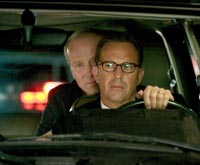I can’t be the only one frustrated with movies that make us root for characters whose unsavory acts conflict with our moral convictions. As fun as George Clooney and his associates are in Ocean’s Eleven, they’re still a band of thieves pulling off a multi-million dollar heist. As badly as we want Keri Russell’s character to leave an abusive marriage and find a proper father for her unborn child, Waitress asks us to support an adulterous relationship in the process. And as charming and cordial as Hannibal Lecter may be in Silence of the Lambs and its subsequent films, the dude’s still a murderous cannibal.
Mr. Brooks joins a long list of films and literature featuring anti-heroes. Kevin Costner stars in the title role, a loving family man with a successful business and named Man of the Year, no less. But he also carries a dark secret—he’s the elusive Thumbprint Killer.

We’ve heard the story before: The seemingly well-adjusted family man living a heinous dual life. But what if I told you that Brooks isn’t evil exactly? That he doesn’t kill for fun? What if, for him, it’s an addiction? And what if he’s honestly trying to leave his murderous past behind him, doing his best to protect his family from such a shameful, horrific secret? Mr. Brooks may be about a killer—and it certainly has its fair share of suspense and violence—but at heart it’s a movie about addiction (of the worst kind) and the struggle to overcome the temptations of sinful nature.
Skeptical? I would be too, but the film pulls it off in its execution—er, that is, implementation.
The movie begins in darkness with the whispered words of Brooks … fervently praying The Serenity Prayer in bed. Reinhold Niebuhr’s prayer is familiar to members of Alcoholics Anonymous, and indeed, Brooks attends the meetings: “Hi, my name is Earl Brooks, and I’m an addict.” He just refrains from identifying what kind.

Our anti-hero is making great personal strides in his life. Business is booming, the family seems happy, and it’s been two years since his last murder. But as any addict can relate, temptation can come calling at any time—literally so for Brooks, in the form of Marshall (William Hurt), a separate personality in Brooks’ mind representing his dark side. Though Marshall isn’t purely the id of Brooks’ personality, he’s the voice inside us that rationalizes immoral behavior (“Why do you fight it so hard, Earl?”), almost like the little devil sitting on the shoulder of a cartoon character.
Unfortunately, giving in to temptation is only a matter of time for Earl. On the fateful night that opens the movie, he shoots a young couple in their home during bedroom sex. Never again, he tells himself while methodically removing all traces of his presence from the apartment like a practiced professional, and you can’t help but wonder how many times he’s thought that before. Yet we believe his shame and remorse—maybe this really is the last time.
Problem is, Brooks has gotten sloppy from lack of practice, and it costs him. A neighbor identifying himself as Mr. Smith (Dane Cook) photographed Brooks in the act and threatens to expose him to the authorities. That is, unless … well, that would be telling, but suddenly Brooks find himself trapped like the thief trying to retire after one last heist. Complicating the matter further is Detective Tracy Atwood (Demi Moore), a tough-as-nails cop who has been on the trail of The Thumbprint Killer for years—his resurgence renews her tireless drive to apprehend him. And if that’s not enough, Brooks’ daughter Jane (Danielle Panabaker) is suddenly home after dropping out from college, her reason for doing so a mystery that also tangles into Brooks’ complicated web of a personal life.

All of this combines into one of the more nuanced thrillers to hit the silver screen in a long time—a clever twist on the serial killer genre that keeps you guessing where it’s headed. And even more surprisingly, it’s got some heart and emotional resonance to it. Will Brooks get caught? We’d want him to, except the guy is likeable and apparently sincere in his desire to change, plus the truth would devastate his family. Should he be brought to justice, or is it possible for him to work his way out of this and overcome his past?
The film doesn’t necessarily answer these questions, but it does force you to consider them as the story unfolds. It doesn’t attempt to rationalize or justify Brooks’ behavior, but by defining it in this movie as an illness beyond his control, it gives us reason to root for him—not to kill again, but to overcome and move on. Whether or not he succeeds is another matter.
Reprehensible as his crimes may be, Brooks represents a struggle with sin we all can relate to. Instead of Hannibal Lecter or Norman Bates, he has more in common with Tom Ripley of The Talented Mr. Ripley, though more sympathetic and less creepy. Actually, in a weird way Brooks reminds me of Jean Valjean of Les Miserables, not so much his capacity for good, but rather his desire to escape his past and spare his loved ones from shame. The movie may even surprise you with Brooks’ hypocrisy—though he shows disregard for human life in some areas of his life, he uplifts it in others.
Costner’s familiar boy-scout charm amplifies the likeability and heart of Brooks, resulting in easily one of his best performances in a hit-and-miss career. If Brooks were merely cold, detached, and calculating, then we’d have every reason to side with those who want to expose his dark secret. But because Costner plays him as an everyman who loves his wife, cares for his daughter, fears what he’s capable of, and weeps over his failings, we care for him as he reasons through his dilemma.

Which brings us to the other side of this persona. After his recent Oscar-nominated cameo in A History of Violence, William Hurt turns in another delightful performance as Brooks’ dark half, Marshall. The chemistry with Costner is terrific, bringing humor to the film because he cynically voices what many of us are thinking—there’s almost something a little Screwtape about him. And it’s a fascinating character because while Marshall’s malevolence is in stark contrast to Brooks’ kindness, it’s also the perceptive side that Brooks must turn to in order to read people and assess situations. In other words, it demonstrates the complexity of human nature and its faculties—our sinful side is never far removed from our capacity to think and feel.
Where the movie falls a little short is in the other characters. While Cook, as the conniving Mr. Smith, is the perfect foil to Brooks’ personality/personalities, his character’s behavior seems a bit far-fetched. Moore is well cast as a complicated cop who seems to have other motivations beyond the paycheck, but her anger and pottymouth make her unlikeable. And her action sequences feel tacked on, as if the filmmakers felt a cerebral game of cat-and-mouse wasn’t enough, needing to add a car chase, a shootout, and a creepy search of a suspect’s home on top of it.
Mr. Brooks is not your typically gruesome serial killer thriller like Se7en or even CSI—half of the film’s potential for violence is never even shown. But it does have its moments of blood and intensity which come fast and furious, including the murder near the film’s beginning—which also graphically shows a naked couple having sex.
I wish co-writer and director Bruce A. Evans (Starman, Stand By Me) had shown more restraint, particularly the few bloody moments. Because then he would have had something on par with Alfred Hitchcock on his hands: a thriller that like Psycho relies more on menace and suspense than shock value.
He nevertheless deserves credit for crafting a thriller that makes you think and feel about the core characters. Is Brooks repentant? Is he beyond redemption? That’s a launch point for a great discussion about morals, ethics, and spirituality. I believe Brooks is capable of leaving his past behind and doing the right thing, even if it’s a difficult choice. Problem is, he’s still listening to the wrong voice inside.
Talk About It
Discussion starters- Is Earl Brooks mentally ill, or is he simply rationalizing his murders? What about those who struggle with alcohol, pornography, and other temptations? Are people to blame for being drawn to such behavior? To what extent are these things diseases as opposed to bad decisions?
- Do we have a choice when it comes to addiction? How do we overcome? What promise(s) does God offer to those who wrestle with temptation? (See 1 Corinthians 10:12-13 and Hebrews 2:5-18)
- Is Brooks a man or monster? Is there redemption for someone like him? Who can Brooks talk to about his condition? Who can he confess to? Is there any way out for him beyond death or turning himself in?
- What does Marshall represent in Brooks’ personality? Do we all have similar traits within us? How do we keep the positives while restraining our capacity for sin? (See Romans 7:7-25)
The Family Corner
For parents to considerMr. Brooks is rated R for strong bloody violence, some graphic sexual content, nudity and language. Still, for a movie centered on the life of a serial killer, the film is not driven by scenes of violence—some of the murders are never shown. Nevertheless, there are still a couple of very bloody stabbings, and some intense action involving gunplay. A couple is shot in the nude after a fairly graphic sex scene. And there’s lots of profanity, most of it the f-bomb. Despite the film’s smart handling of the subject of addiction, the movie is certainly not for everyone and parents are strongly cautioned to heed the R-rating.
Photos © Copyright MGM Distribution Co.
Copyright © 2007 Christianity Today. Click for reprint information.












